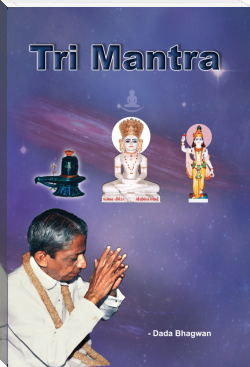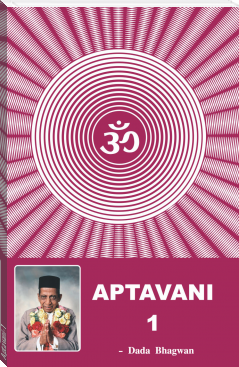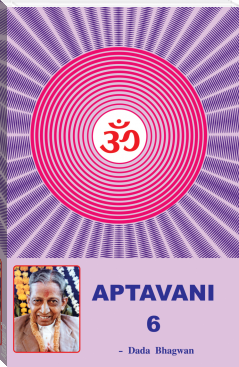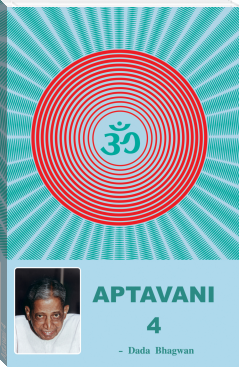Aptavani-2 by Dada Bhagwan (interesting novels to read .txt) 📕

- Author: Dada Bhagwan
Book online «Aptavani-2 by Dada Bhagwan (interesting novels to read .txt) 📕». Author Dada Bhagwan
By giving us great examples that are useful in our everyday life, Dadashri has made it simple for us to come out of negative and adverse meditative states and remain in dharma dhyan. Every person will be able to adjust to this in his or her own way.
q The one in whom all negative passions are gone can attain the status of Godhood. However, rare indeed are those where no negative passions arise within them, but also through their being, they do not incite negative passions to arise in others either. Such beings are the ones the world will worship. As such, the Gnani Purush is beyond all adjectives; to give Him the adjective of ‘Bhagwan’ (God) is the same as trying to compare that which is incomparable and in doing so, we lower His unparalleled status. Yet, to let the world know about Him, people use the terms ‘Bhagwan’, ‘Sarvagnya’ etc. What does sarvagnya mean? It means the One who knows all that is meant to be known; an Omniscient. There are two types of the Omniscient (sarvagnya). One is a causal omniscient (karan sarvagnya) and other is effect omniscient (karya sarvagnya) i.e. omniscience that has come in one’s worldly conduct.
The Lord regards all ongoing activities in this current life as activities that have already been completed (they are simply effects of causes that were created in the past life).
For example, if someone left home to go to Baroda, and five minutes later, somebody asks you, “Where did he go?” What answer will you give? You will say, “He has gone to Baroda.” Now he has barely reached the railway station. Lord Mahavir regards the action that is in progress, as completed action (its full causes having been laid in the past life). Thus, the one who is harboring the causes to become omniscient verily is called the causal omniscient. Dada Bhagwan is causal omniscient – karan sarvagnya.
q The law of the world is that the one whose mistake is clearly visible is the one at fault, whereas the law of nature states, ‘The fault is of the sufferer.’
‘If anyone is hurt even to the slightest extent, you should believe that it is your fault.’ - Dadashri
The person who lives according to the law ‘fault is of the sufferer’ does not have to suffer anything in this world; he does not have to suffer any pain that comes at the hands of others (his nimit). One is bound by his own faults, and he who has broken the bondage of all faults, becomes the absolute Self! The Vitarag Lords broke all their bondages of faults and attained moksha! We have to attain liberation in the same way. The Vitarags represent our ultimate goal (dhyeya) and the manifest Gnani Purush is the original connection for that very purpose! To say ‘it is not my fault’ is the biggest fault; it creates a dense layer of covering over that fault.
Krupaludev has said: “I am a receptacle of infinite faults, O Compassionate One!”
When one is a ‘vessel of infinite faults’, there are faults at every step. Alas! Our existence here in this world, is it not the biggest blunder of all? How can one blame others when he is himself is full of faults? To find faults in others is a very dense illusion. There is nothing worse than that.
‘The one, who abolishes even a single fault of his own, is called God.’
‘In this world, there is no one superior to you. This, I guarantee you. No father figure (bapo) is your superior. Only your faults are your superior (boss).’ - Dadashri
Once the answer to the question ‘Who am I?’ is known, one progresses rapidly on the path of abolishing all faults and ultimately becomes parmatma, the supreme Self!
q The rule of the world is that if someone says something bad to you, you will see that person as being at fault. You will question, ‘Why did he say that to me?’ or ‘Why did he do that to me?’ Thus, you will believe that you have been subjected to injustice. In fact, justice is not to be sought. Whatever suitable or unsuitable treatment you receive from others, it is due to your own karmic account, so where is the need to seek for justice in this world? Everybody’s worldly interactions (vyavahar) are unfolding according to their own karma from their past life. Furthermore, whatever is unfolding is precisely the effect of their own karmic accounts that they themselves created. So in all this, if one seeks worldly justice or does not accept nature’s account, how will he escape the beating due to him in doing so?
For the one who understands and accepts ‘this is my fault’; for the one who has arrived at this stage, there is ‘justice’ and his faults are abolished. But the one who says, “This is not my fault”, for him there is the worldly life to make him understand!
q The common understanding of pain and pleasure that people have is in fact not actual pain or pleasure. The Lord says that it is really the experience of pain (ashata vedaniya) and experience of pleasure (shata vedaniya) of karma. These events are for a fixed period of time and by nature are temporary; these are all circumstances and all circumstances are temporary. Now as per general understanding, if these karmas of suffering are believed to be long lasting and given greater importance, then one will experience greater suffering. All pleasures and pains of worldly interaction have an end. Only the bliss of the Self is infinite and eternal and that is the only thing one needs to attain.
Through the common understanding, the illusionary valuation of worldly pleasures and pains create very grave and dangerous bondages of karma. Amidst such situations, Dadashri has given the world, very simple, natural and yet exact ‘knowledge-vision’ of the Self. Once this is understood in exactness, it makes one free from the effect of all pleasures or pains of everyday worldly life.
q ‘To be overcome by mental and physical fatigue (kantado) is a state similar to sleeping on a bed of thorns.’ - Dadashri
Now, who is the fortunate one who has not experienced such fatigue? Many great teachers, priests, saints, ascetics and men of glory have not been without this feeling of tedium. Only the Gnani Purush does not have to experience tedium! One should deal with situations of mental and physical fatigue with equanimity, instead people try to look for ways to remove it or escape it. Arey! Going to the cinema, drama or doing other things makes one regress spiritually and in fact, the tedium is not removed, it is merely pushed aside for a little while only to return with double the force. This is because karma that has come into existence to give result will not spare anyone; one has no choice but experience its effects.
q The difference between people’s understanding of raag-dwesh (attachment-abhorrence) and the Vitarag’s understanding of the same is comparable to the difference between milk and buttermilk. ‘I am Chandulal’ is attachment (raag). To falsely project one’s self where one is not, is raag. The one who realizes ‘I am Shuddhatma (I am a pure Soul)’ has broken all attachments.
In their common understanding when people say ‘I have a lot of attachment towards this person or that person’, it is not correct. In fact, the Soul does not have the attribute of attachment. What appears to be attachment is really attraction of the parmanus (sub-atomic particles that cannot be further divided) and what appears to be dwesh (abhorrence), is in fact repulsion between the sub-atomic particles. This is all the ingenuity of the pudgal, the non-self complex, but one believes that attachment and abhorrence are occurring to ‘me’ and hence one inadvertently declares the Soul as having the attributes of attachment and abhorrence. The Soul is always vitaragi (without attachment) and will always remain as one.
‘Love for agnan (ignorance) is raag and love for Gnan (enlightenment) is Vitarag.” - Dadashri
q The foundation of this world is based on vengeance (veyr). If vengeance is eliminated, the worldly life will be naturally eliminated. There is only one way to become free from vengeance and that is ‘to settle all files with equanimity’. In this day and age, to take refuge of this ‘weapon’ is invaluable. Dadashri has given us this ‘weapon’. Now, the one who goes to ‘war’ with this ‘weapon’ is a true valiant. Is the worldly life not but a war? Hence, in this ‘war’ you have to settle all your files with equanimity. The person, who goes to war with this weapon of Dadashri, will definitely be triumphant and what will be his victory? Moksha! Dadashri has referred to the presently acquired complex of mind, speech and body as a ‘file’ and once a person comes to attain this inner vision, he attains spiritual triumph!
q In so far as a single charged particle is effective, can a relation with a receptacle (human being) filled with infinite particles be without effect? Whether that relation is with good company or bad company, the effect will definitely be there. And this ‘satsang’ i.e. association with the eternal; being in the company of Dadashri, is the only association that liberates one from attachments to all relations and circumstances. The meaning of the word ‘satsang’ here has a completely different connotation as compared to that used elsewhere in the world. The Gnani Purush, who despite being amidst all circumstances and association with others, remains eternally in a state free of all attachment. Anyone who attains satsang with the Gnani Purush will definitely attain freedom from all attachments. The satsang of such a Gnani Purush is fresh and new, every day of the year and every hour of the day.
With satsang, the subatomic particles of kusang (association with worldly things) will disperse and new and pure particles will enter.
“If a cooking pot absorbs the odor of asafetida (hinga) and six months later you cook doodhpaak (dessert of milk, rice, sugar, nuts and cardamom) in it, your doodhpaak will be ruined. The effect of the odor (‘stain’) of asafetida lingers for six months, but the ‘stain’ of kusang will ruin your life for infinity!” - Dadashri
q Mantra is a science; it is not a fake speculation. Especially the Trimantra; it is helpful in destroying obstacles of the worldly life. Trimantra is impartial; it indicates equanimity for all religions. The celestial beings that protect all religions are pleased when we recite the Trimantra. When does a mantra become effective? It has an immeasurable effect if it is given by a Gnani Purush! As long as one is involved in life’s interactions, one should offer all the three mantras at the same time, i.e. the ‘Navkar (Namokar)’, ‘ Namo Bhagavate Vasudevaya,’ and ‘ Namah Shivaya.’ To offer only the Navkar mantra is proper for the sanyast being (Self-realized). Until one attains the sanyast state, he should recite all three mantras together. Renunciation does not mean changing of clothes; it means renunciation of the non-self i.e. renunciation of one’s identity as being the non-self or the relative-self and the realization of the Self as being the Soul.
q Dadashri explains the current condition of





Comments (0)